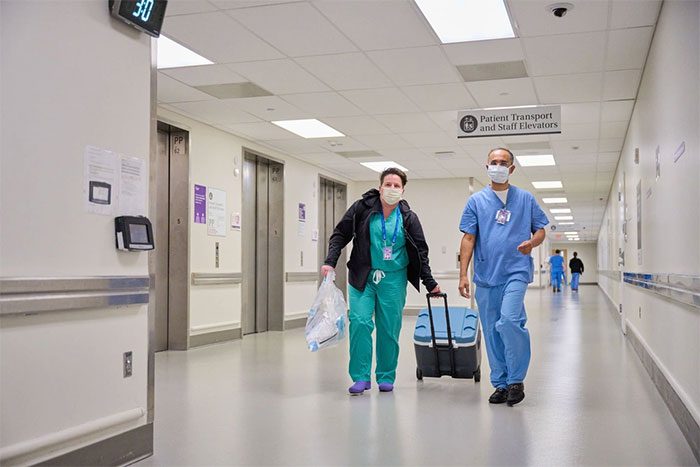Researchers are employing a new infectious disease protocol designed to ensure that porcine viruses do not transmit to organ transplant recipients.
Two brain-dead patients in the United States have received genetically modified pig heart transplants, as scientists work to improve trials regarding porcine viruses in pig organs and gather data to initiate clinical trials for xenotransplantation from animals to humans.
New Protocol
Scientists at NYU Langone Health in New York City, where the studies took place in June and July, stated that the pig hearts were transported by air from a facility hundreds of miles away and were transplanted into two recently brain-dead individuals, Lawrence Kelly, 72, and Alva Capuano, 64.
Kelly was a welder from Beaver Meadows, Pennsylvania, and Capuano was a teacher in New York City.
According to his fiancée Alice Michael, Kelly suffered a heart attack while driving alone. Capuano, who had received a kidney transplant from her son years ago, experienced a heart attack at home, as confirmed by her husband, Richard Capuano.
Both were later declared brain dead by doctors and were maintained on life support. Their families consented to donate their bodies for scientific research.
In the U.S., brain death is defined as the irreversible cessation of all brain function, even if heart and lung activity can be maintained mechanically.
Research at NYU Langone Health focuses on collecting data on how the pig hearts function and implementing a range of new strategies to test and prevent the transmission of viruses in pigs.
This area has long been of interest to the U.S. Food and Drug Administration (FDA), with increased concern following the death of a man in Maryland who received a pig heart transplant in January, which was later found to contain porcine virus.
In the study, scientists utilized a new infectious disease protocol aimed at ensuring that porcine viruses do not transmit to research subjects who received genetically modified pig hearts or to the healthcare providers involved in the trials.
According to Nader Moazami, the Director of Heart Transplant Surgery at NYU Langone Health and the lead surgeon for the pig heart procedures, the pig hearts were not immediately rejected by the human recipients and functioned during the three-day study period. The data has not yet been published or peer-reviewed.

The facility at NYU Langone used for pig heart research will only be designated for future xenotransplant studies, according to the lead researcher. (Photo: Wall Street Journal).
The potential for porcine viruses in organ transplants to cause serious infections or viral transmission to recipients and their family members, friends, caregivers, and broader communities is considered one of the significant risks in the field of xenotransplantation.
This issue arose after the transplant of David Bennett, a 57-year-old man from Hagerstown, Maryland, who received a genetically modified pig heart at the University of Maryland Medical Center in Baltimore. This transplant aimed to extend the life of a severely ill man. He passed away in March, 60 days after the transplant surgery.

Ultrasound image of the pig heart after transplant into Mr. Bennett. (Photo: The New England Journal of Medicine 2022).
In-depth Research on Porcine Viruses
The FDA, the regulatory body overseeing xenotransplantation, has prioritized the prevention of disease transmission from animals to humans throughout its two-day public advisory committee meeting on xenotransplantation held last month.
The FDA plans to allow clinical trials testing the transplantation of pig organs into humans, according to a source familiar with the matter.
The push for xenotransplantation stems from the ongoing shortage of human organs. More than 100,000 people in the U.S. are on the national organ transplant waiting list, according to the United Network for Organ Sharing, a nonprofit organization contracted with the federal government to allocate organs. Additionally, over 6,000 people die each year while waiting for transplants.

Pig heart transplant research being conducted at NYU Langone Health. (Photo: Wall Street Journal).
During the FDA advisory committee meeting, scientists discussed which pig diseases should be tested before animal organ transplantation into humans. In addition to porcine cytomegalovirus (CMV) — the virus found in Mr. Bennett’s pig heart — scientists proposed testing for several common pig viruses, such as porcine lymphotropic herpesvirus and porcine circovirus, as well as porcine endogenous retroviruses (PERVs) found in the genome of all pigs.
The genetically modified pigs used in the two pig heart studies at NYU and in the emergency transplant procedure in Maryland came from Revivicor Inc., a company based in Blacksburg, Virginia.
Scientists have developed specific tests for porcine viruses in organ transplant recipients and are working on a test to determine whether a pig has been exposed to CMV even if it is not infected with the virus, according to Dr. Sapna Mehta, Director of the Infectious Disease Program and Clinical Director at the NYU Langone Transplant Institute.
In addition to concerns about common porcine viruses, scientists are also worried about the potential risk of unidentified animal viruses, Dr. Mehta stated.
Blood Sample Storage
The expert mentioned that blood samples were collected from the two individuals who received pig heart transplants and from members of the medical team involved in the research. These samples are being stored so that if new porcine viruses are identified in the years to come, researchers can examine them and track anyone who may have been exposed.
Experts in infectious disease transplantation are compiling a “white paper” proposing ways to monitor the potential for porcine virus infections in pigs and transplant recipients, according to Dr. Jay Fishman, Director of the Transplant Infectious Disease Program and Host Defense at Massachusetts General Hospital.
Muhammad M. Mohiuddin, a professor of surgery at the University of Maryland and one of the doctors involved in Mr. Bennett’s surgery, stated that scientists continue to study Bennett’s case to understand the role of porcine viruses in the transplanted heart in his death.

Doctors at NYU Langone Health prepare the pig heart for transplant last week. (Photo: Wall Street Journal).
Scientists have revisited the blood samples they stored and utilized more sensitive tests that can detect the presence of viruses, Dr. Mohiuddin noted. They are also re-testing samples from baboons that received pig hearts and identifying some previously missed cases of virus infection in earlier experiments.
The new data will be part of their discussions with the FDA later this summer to seek guidance on any additional steps that may be necessary to initiate human trials, Dr. Mohiuddin stated.
In the NYU trials, a special research oversight board at NYU reviewed and approved the procedures, and researchers proceeded only after consulting with the New York State Department of Health, according to transplant surgeon Moazami.
Dr. Moazami emphasized that to further prevent any potential infections, the operating room, equipment, and instruments used in the pig heart studies will only be utilized for future xenotransplant research. He added that these measures are necessary due to the potential infectious risk of porcine viruses, which is also a public health concern.
“If this can be applied to a large number of patients worldwide, then that is the only way to build public trust in the process,” he stressed.



















































